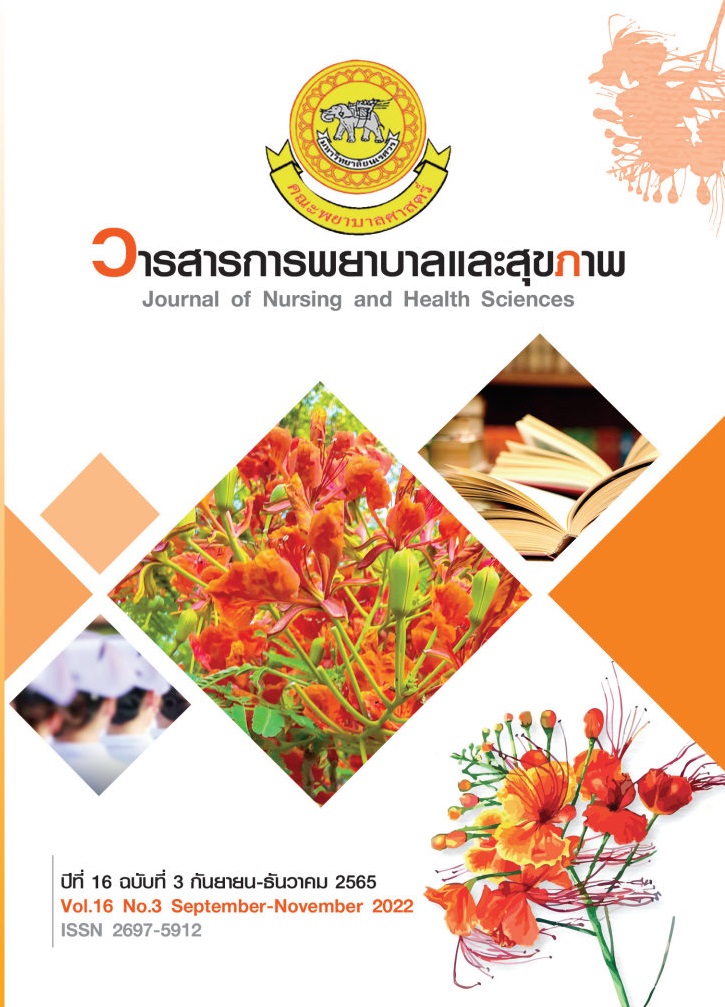Translation and Validation of the Typology of the Aged with Illustrations Measurement in the Thai Version
Main Article Content
Abstract
This research aimed to translate and examine the validity and reliability of the Typology of the Aged with Illustrations in the Thai version. The English version was translated into Thai using the five steps of a back-translation method (Brislin, 1970; 1986). The participants were 322 older adults. The research instrument was Barthel ADL Index and the Typology of the Aged with Illustrations. The demographic data were analyzed by using descriptive statistics. The Item and scale level content validity index were computed for content validity and criterion-related validity was analyzed by using Pearson product moment correlation.The results revealed that the Thai version of the Typology of the Aged with Illustrations had content and semantic validity as compared to the original version. The Item-level content validity index were 89 .89 1.0 .89 and Scale-level content validity index was .92. The criterion-related validity showed a high score for group identification and positively correlated with Barthel ADL index at a statistically significant level of .05. Moreover, Cronbach's Alpha was .87. The research findings indicated that the Typology of the Aged with Illustrations in the Thai version had high content validity and reliability. It can be used for categorizing the group of older adults to provide appropriate nursing care.
Article Details

This work is licensed under a Creative Commons Attribution-NonCommercial-NoDerivatives 4.0 International License.
References
Brislin, R.W. (1970). Back-translation for cross-cultural
research. Journal of Cross-Cultural Psychology,
(3), 185-216.
Brislin, R. W. (1986). The Wording and Translation
of Research Instruments. In W. L. Lonner &
J. W. Berry (Eds.), Field Methods in CrossCultural Research. (pp.137-164). Newbury
Park, CA: Sage.
Charoenwong, S., Kongkun, P., Chansangrat, N.,
Sriwan, P., & Niramangul, R. (2018). Dependent
elders in a southern rural Muslimcommunity:
Current situation of care and needs for longterm care. The Southern College Network
Journal of Nursing and Public Health, 5(2),
-246. [In Thai].
Granger, C.V., Dewis, L.S., Peters, N.C., Sherwood,
C.C., & Barrett, J.E. (1979). Stroke rehabilitation:
analysis of repeated Barthel index measures.
Archives of physical medicine and
rehabilitation, 60(1), 14-7.
Institute for Population and Social Research, Mahidol
University. (2021). Thailandometers 2021.
Retrieved 13 November 2021 from http://www.
thailandometers.mahidol.ac.th /#elderly.
Jitapunkul, S. (2001). The main principles of
geriatric medicine (3rded.). Bangkok:
Chulalongkorn University. [In Thai].
Jones, P.S., Lee, J.W., Phillips, L.R., Zhang, X.E., &
Jaceldo, K.B. (2001). An adaptation of Brislin's
Translation Model for cross-cultural research.
Nursing Research, 50(5), 300-4.
Kitsadachatree, P. (2019). Cognitive status, cognitive
thinking, andmemory of the elderly.
Journal of MCU Humanities Review, 5(1),
-72. [In Thai].
Krejcie, R.V., & Morgan, D.W. (1970). Determining
sample size for research activities. Educational
and Psychological Measurement, 30(3), 607-10.
Mahaprom, T., Monkong, S. & Wongvatunyu, S.
(2017). Tai Chi practice and its impact on
elderly people's balance. Thai Journal of
Nursing Council, 32(3),50-65. [In Thai].
Mahoney, F. I., & Barthel, D. W. (1965). Functional
evaluation: The Barthel Index: A simple index
of independence useful in scoring improvement
in the rehabilitation of the chronically ill.
Maryland State Medical Journal, 14, 6165.
Mauk, K. L. (2014). Gerontological Nursing:
Competencies for Care (3rd edition).
Burlington, MA: Jones & Bartlett.
Nawsuwan, K., & Suwanraj, M. (2019). Current
problems and care needs of older adults
living inlocal administrative organization
responsibility area in the lower southern of
Thailand. Boromarajonani College of Nursing,
Uttaradit Journal, 11(2), 118-132. [In Thai].
Okochi, J., Takahashi, T., Takamuku, K., Matsuda,
S., & Takagi, Y. (2005). Reliability of a geriatric
assessment instrument with illustrations.
Geriatrics and Gerontology International, 5(1),
-47.
Takahashi, T., Okochi, J., Takamuku, K., &Matsuda,
S.(2001). The introduction of typology of the
aged with illustrations. Casemix Quarterly,
(1), 314.
Takahashi, T. (2021). ICF illustration library.
Retrieved 6 March 2021 from http://www.
icfillustration.com/icfil_eng/top.html
Tepvorachai, U., Yodpinit, S., Detkasem, N., &
Komphayak, U. (2021). Knowledge of elderly
health care in the homes of senior high
school students in Pathum Thani province.
The Journal of Pacific Institute of Management
Science (Humanities and Social Science),
(2), 671-679. [In Thai].
The 3rd National Plan on The Elderly 2023-2037.
retrieved 9 November 2021 from https://
www.dop. go.th/ download/laws/th165355
-843_0.pdf.
Wanitchakham, A. (2019). Preparation for aging
society: A case study of Sai Mai district,
Bangkok. Journal of Association of Private
Higher Education Institutions of Thailand
(APHEIT). 25(1), 164-179. [In Thai].


